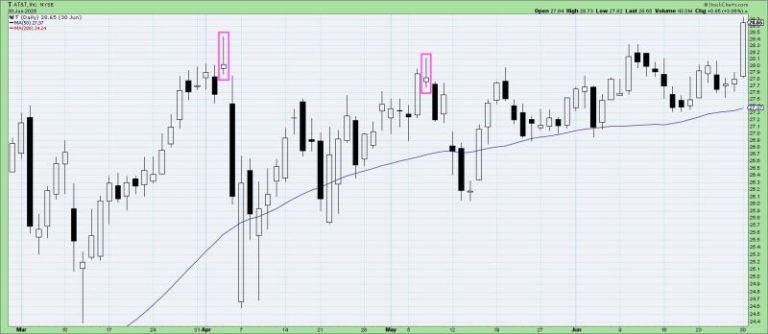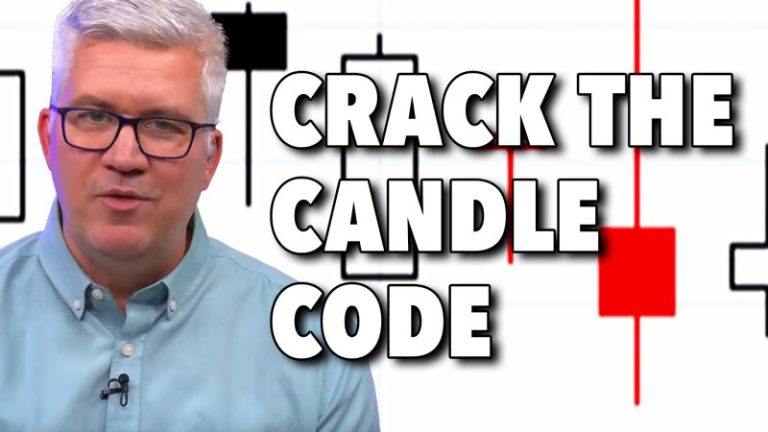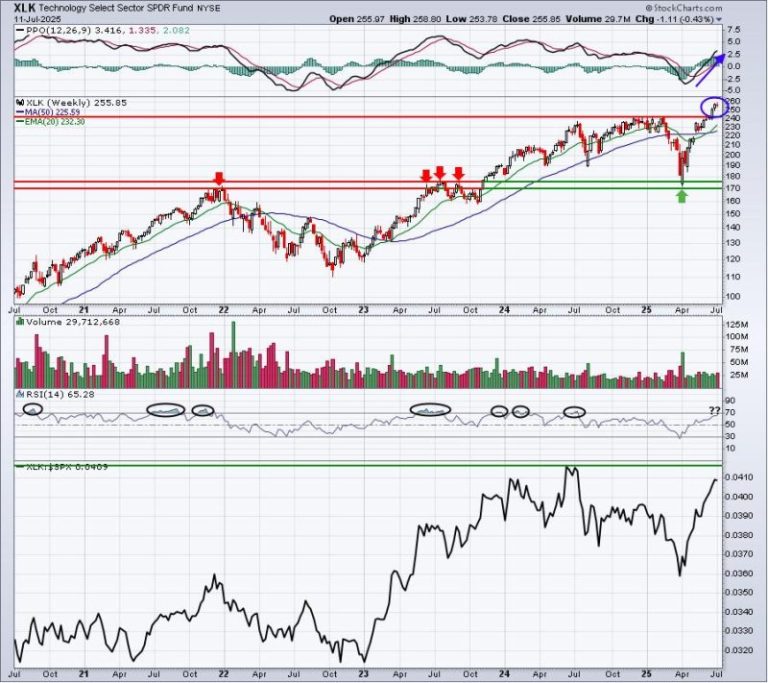As we navigate the evolving stock market landscape, understanding key sectors and their trends is important, especially during earnings season. This week, the spotlight shines on the Financial sector, with several of the largest banks reporting. Five of the top 10 holdings within the Financial Select Sector SPDR ETF (XLF) are on deck: J.P. Morgan (JPM), Goldman Sachs (GS), Bank of America (BAC), Wells Fargo (WFC), and Morgan Stanley (MS).
This week we will focus on the Financial sector via XLF and zoom in on one of its top components, Goldman Sachs.
The Financial Sector: A Technical Look at XLF
XLF has been outperforming the S&P 500 ($SPX), experiencing new all-time highs, and has been a leading sector in the most recent market rebound.
Now that all banks that were susceptible to the Fed’s stress test have passed with flying colors, questions loom about whether less stringent regulations will lead to more growth. The sector has not experienced much M&A activity, and the IPO market has yet to come back to a healthy level of activity. However, there is hope that a banking renaissance is on the horizon, and maybe this quarter will give a rosier outlook than more recent forecasts.
Technically, XLF looks promising. Shares broke out to new all-time highs ahead of earnings and are now set up with good risk/reward potential for investors.
The pattern from which it broke out is a bit of a wonky head-and-shoulders pattern. I’d call this a stretch as it isn’t picture perfect, but the price image presented is close enough to set parameters to trade.
The breakout on a gap to new highs is extremely bullish, and that gap level could be used as a stop-loss to the downside, worst case should be the rising 50-day moving average. Buyers should come back into the sector there on a dip.
Goldman Sachs (GS): A Bellwether
Goldman Sachs, the largest component in the price-weighted Dow Jones Industrial Average, reports results on Wednesday morning just days after hitting all-time highs. Investors will be looking for any commentary focused on tariffs and margins.
Has there been any impact on their results, or have concerns about inflation been overblown? Any earnings pressure on their bottom line could cause ripple effects throughout other sectors like industrials, materials, and technology.
Shares declined 33% then rallied 65% from their April 7 lows. Shares may need a breather as they are overbought, but that’s where opportunity may lie. Wouldn’t chase it just yet. I would own for the long term, but price action could be very interesting when they report next week.
One bold prediction — look for a possible stock split announcement. Since their debut in 1999, shares have never split. Seeing the recent price surge and its size in the Dow, that option should be on the table.
Technically, shares have been on a tremendous run as they’ve rallied 65% from their April 7 lows. Shares may need a breather as they are overbought, but that may be where the opportunity lies when they report next week.
The stock has rallied with a series of gaps along the way. Those gaps tell a story, and it’s worth watching the most recent gap from $690 to $700. Each jump higher has not experienced a full retracement — a gap fill, if you will.
The gaps higher have been very bullish. The first large gap — a breakaway gap — started the main part of this rally. We have seen a series of smaller gaps that helped extend the rally. Now, we may be tiring. Watch the $690 level to see if that gap can hold. If it can’t, then there may be more selling pressure over the near term.
A healthy pullback given the strong bull run is likely, but buyable. A break below $690 could see a swift move lower to the $665 level. If things turn negative, then the rising 50-day moving average, which coincides with a key Fibonacci retracement level just below $620 would be an ideal entry point from a risk/reward perspective.
The good news is that any weakness in the stock looks like it should be met with great opportunities to enter the name. The long-term trend is up, and the momentum is there not only in the stock but within the sector. The long-term trader shouldn’t fret earnings; the swing trader may get an opportunity to buy a dip from an overbought condition. The bad news would be that the stock gaps higher again and continues its upward trajectory.
Beyond Financials: Johnson & Johnson (JNJ)
While financials take center stage, we want to touch upon another significant company reporting this week: Johnson & Johnson (JNJ).
JNJ shares have remained relatively flat for the better part of five years. Much of the earnings focus will be on plans to navigate patent expirations.
Merck acquired Verona last week. The patent cliff will continue to be a hot topic for the entire pharma industry. As for JNJ, it’s confronting the expiration of exclusivity on Stelara, its $10B+ immunology blockbuster drug. The exclusivity expires first in Europe this year and then in the U.S. in 2026.
As for reaction to earnings, don’t expect too much activity. The average move post-results has been +/- 2.05%. Shares have traded lower after five of the last seven times. Shares of the Dow stock are up 8% year-to-date and -9% off their highs.
Technically, there isn’t much to see here. We backed it out to look at price in a five-year weekly range to illustrate that point.
Shares have been in a wide range between roughly $138 to $168 over this lengthy span. Yes, I yawned when I typed this out — it’s that boring. We don’t expect much to change, but there are small setups for a shorter-term swing trader.
The stock, while breaking above the midpoint of this longer-term range, is forming a bullish ascending triangle and has, albeit tight, risk/reward parameters for those looking to trade.
To the downside, look for the continued near-term uptrend to hold and find support right at the 200-day moving average just below $153. A good entry point in which one could manage risk.
To the upside, a break above $158 could take shares to their recent highs and slowly and steadily towards the $168 level. The set-up is far from ideal when looking at the longer-term action, but near term, there could be a quick play and maybe, just maybe, shares can finally escape the longer-term neutral range.










